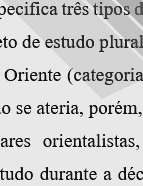

The textual efforts to revisit the history and memory of the Portuguese presence in the East did not, however, neglect the need to create infrastructures to support the development of Oriental studies in Portugal, with frequent calls being made to (re)organize and catalogue documentary collections from the end of the nineteenth century onwards. It would be only a half-century later, in the 1950s, that figures like Silva Rego would step forward, in his case with the project for the Filmoteca Ultramarina Portuguesa [Portuguese Overseas Film Library]. Established on 28th January 1952 and integrated into the recently founded Centro de Estudos Históricos Ultramarinos [Centre for Historical Overseas Studies] in 1955, this institution’s objective was to give material continuity to the history of the Portuguese presence in Asia by bringing together microfilm versions of documents relating to Portugal’s expansion scattered across various archives around the world. The idea was, in essence, to create a documentary space for the conservation of the memory of the empire.
Revisiting the history of Portugal’s influence in the Orient through the heroes and famous episodes of this past ultimately functioned as a kind of genealogy, which also traced the development of a particular corpus of knowledge: Oriental studies – or orientalism. In the discourse presented by Portuguese orientalists from the end of the nineteenth century up until the 1920s, this genealogy is, in reality, the genealogy of the absence of these studies in Portugal, despite the fact that, in light of the present state of the art, this period is, to this day, that during which Oriental studies and orientalism most flourished in Portugal. This act of revisiting the past also manifests itself in fin-de-siècle Portuguese literature. Advances made in transportation and an increase in opportunities to travel to the Orient – bringing people and places closer together – as well as the no less significant opening of Japan to the West in 1854, led to a rise in the transit of journalists, officials of the Portuguese state (including sailors, diplomats and consuls), intellectuals and curious amateurs, who would go on to relate their travel experiences, at times reproducing the subjects of the most academic discourses, and often evoking ethnocentric narratives based on suspicion or on observations about the backwardness or difference of the Other typified as exotic.
